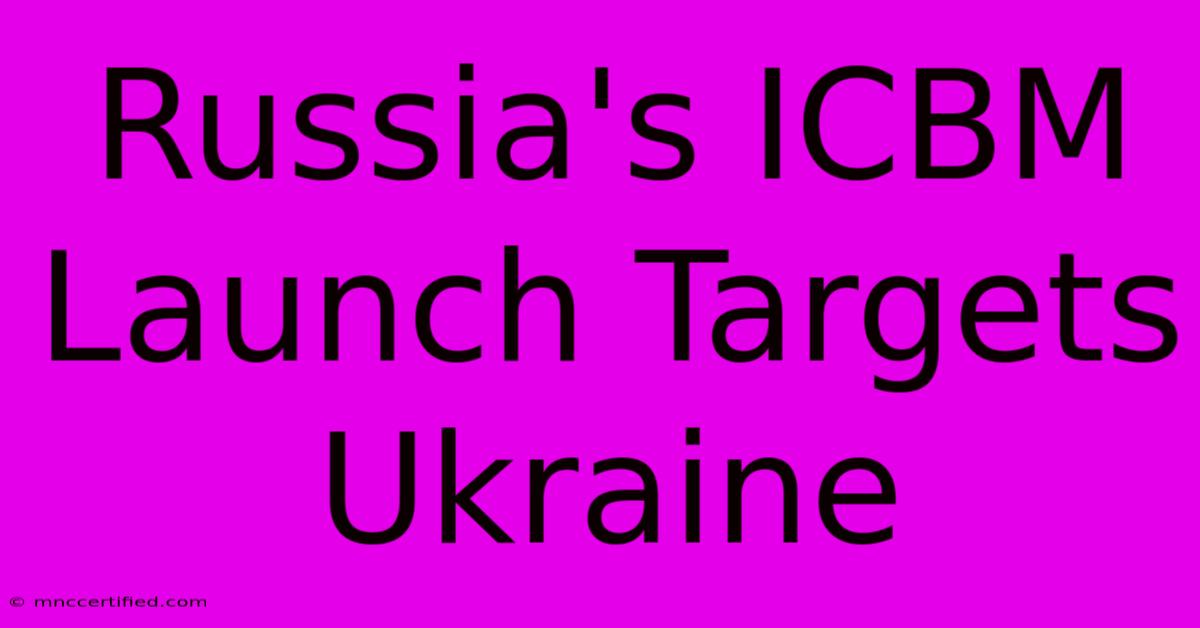Russia's ICBM Launch Targets Ukraine

Table of Contents
Russia's ICBM Launch: Assessing the Targeting of Ukraine
The recent launch of an intercontinental ballistic missile (ICBM) by Russia has raised significant concerns globally, particularly regarding its potential targeting of Ukraine. While the specific targets remain unconfirmed and the situation is highly fluid, analyzing the geopolitical context and military capabilities provides crucial insight into the potential implications of such a launch. This article aims to explore this complex issue, focusing on the feasibility, strategic rationale, and potential consequences of a Russian ICBM strike against Ukraine.
Understanding Russia's ICBM Capabilities
Russia possesses a formidable arsenal of ICBMs, including the RS-28 Sarmat, often dubbed "Satan II," a weapon capable of carrying multiple independently targetable reentry vehicles (MIRVs). This means a single missile could strike multiple locations simultaneously. These missiles are designed for long-range strikes, capable of reaching targets across continents. The sheer destructive power of these weapons, combined with their range, makes any potential deployment a matter of serious global concern.
Is a Direct ICBM Strike on Ukraine Likely?
While the possibility cannot be entirely dismissed, a direct ICBM strike on Ukrainian targets is considered highly unlikely for several reasons:
-
Proportionality of Response: Using an ICBM against Ukraine would be a massively disproportionate response to the current conflict, escalating the situation dramatically and risking unpredictable international repercussions. Such an action would likely trigger a much stronger response from NATO and its allies.
-
Tactical Advantages: Russia already possesses a wide range of more conventional weapons systems that can effectively target Ukrainian infrastructure and military positions. Employing ICBMs would be a significant overreach tactically.
-
Collateral Damage: The sheer destructive power of an ICBM would result in catastrophic civilian casualties and widespread devastation, undermining Russia's stated aims and potentially triggering international condemnation.
-
International Condemnation: Launching a nuclear strike against a non-nuclear state would be a clear violation of international law and would likely result in immediate and severe sanctions and global isolation for Russia.
Potential Scenarios and Misinformation
It's crucial to differentiate between a direct ICBM strike on Ukraine and the use of ICBM tests as a demonstration of military strength or a form of intimidation. Russia has engaged in ICBM testing in the past, often framing these events as routine military exercises. However, these tests can be easily misinterpreted, potentially fueling misinformation and increasing tensions. It's vital to rely on credible sources and avoid spreading unsubstantiated claims.
The Importance of Reliable Information and Verification
In the current information environment, it's paramount to rely on credible sources of information. Government statements from official channels, reports from reputable international organizations like the UN, and verified news from established media outlets are crucial to understanding the situation accurately. Avoid sharing unverified information or speculation, as this can contribute to the spread of misinformation and exacerbate tensions.
Conclusion: Navigating a Complex Geopolitical Landscape
Russia's ICBM capabilities and their potential use in the context of the ongoing conflict in Ukraine represent a complex and concerning geopolitical scenario. While a direct ICBM strike on Ukraine seems improbable due to strategic, tactical, and international considerations, the potential for miscalculation or escalation remains a serious concern. Maintaining a critical approach to information, relying on verified sources, and promoting calm dialogue are essential steps in navigating this volatile situation. The international community must continue its efforts to de-escalate tensions and find peaceful resolutions to prevent catastrophic outcomes.

Thank you for visiting our website wich cover about Russia's ICBM Launch Targets Ukraine. We hope the information provided has been useful to you. Feel free to contact us if you have any questions or need further assistance. See you next time and dont miss to bookmark.
Featured Posts
-
Free Speech Hinders Morrisseys Music
Nov 21, 2024
-
22 80 An Hour Is How Much A Year
Nov 21, 2024
-
When Does Vision Insurance Reset
Nov 21, 2024
-
Murrays Dance Love The Merry Gentlemen
Nov 21, 2024
-
Warren Public Works Winter Ready
Nov 21, 2024